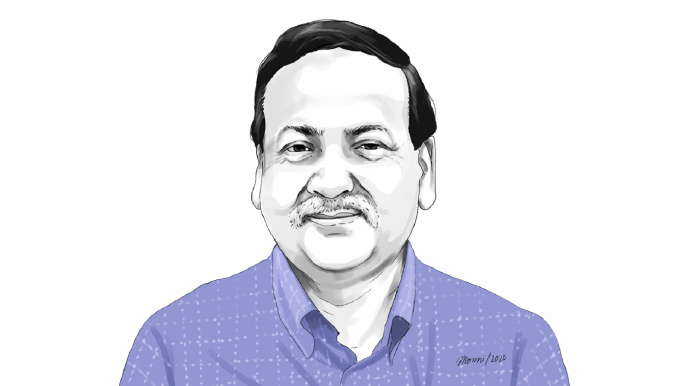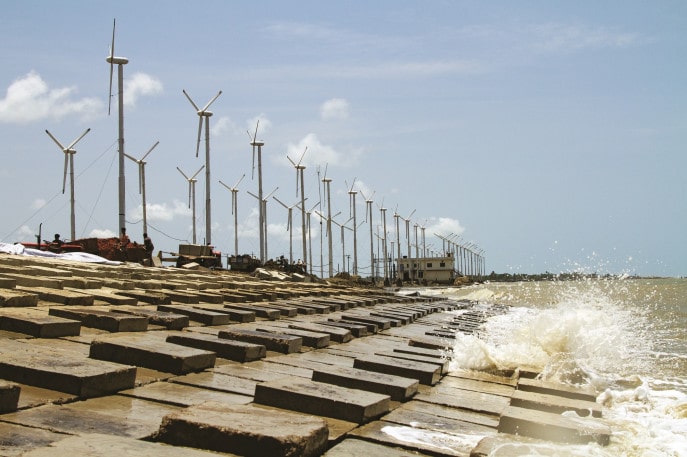
Saleemul Huq is a leading climate expert and is the co-author of a number of Inter-Governmental Panel on Climate Change (IPCC) reports. On the eve of an international climate conference in Dhaka, titled “6th Gobeshona: International Conference on Research into Action” The Business Standard has talked with him on a number of burning issues. The interview was done by Shibabrata Barman.
Australia is burning with wildfires in an unprecedented manner. It’s still out of control. When the entire world is watching with horror the bushfires of Australia, an international conference on climate change is being arranged here in Bangladesh. While the Australian prime minister is in denial of climate issues, our prime minister is at the front row in the battle. How do you perceive the contrast?
Saleemul Huq: This is not contrasted at all, in the first place. We the scientists of Inter-Governmental Panel on Climate Change (IPCC) have been warning over and over again about this fallout. It fell into deaf ears. The Australian government walked the opposite way. They went into a spree of coal mines, and burning fossil fuels. And they stopped donating money to the global climate fund. Now, this is what is happening. Australia is facing the consequences in January of 2020. This is a criminal government. The prime minister of Australia, Scott Morrison is responsible for all this.
By contrast, where does our government stand?
Saleemul Huq: We are doing many things, as we are a victim of climate change. We have accepted the truth that this is going to happen and that we cannot thwart it. We have to adapt to the new normal. The onus of seeking remedies lies in the countries which are liable. However, they are not doing what they are required to do.

Do you, the climate scientists, feel that our government is on the right track?
Saleemul Huq: Absolutely. It is not only about being on the right track, but our government has also taken the lead on many fronts.
What are the specific steps you would like to mention?
Saleemul Huq: Bangladesh is the only country in the world that has prepared a Climate Change Strategy and Action Plan, and that is also 10 years ago. And as soon as the plan was in place, the government started allocating Tk100 crore every year to implement it. Instead of waiting for any foreign donations, we have created our own fund and with the help of it, we have taken several hundred projects over the last decade.
What are the main objectives of the projects?
Saleemul Huq: The objective is to make the country prepared for climate change. We do not mean to resolve the crisis. We cannot. We are seeking ways to adapt. We cannot stop the storms from coming. All we can do is prepare ourselves to minimise their effects. And we are very good at this – good at preparedness.
And what is our approach in this preparedness?
Saleemul Huq: Whatever we are doing, we are keeping in mind the climate considerations. We have integrated it into our national development plans, and our perspective plans. Whenever we are making roads and bridges, we are taking the changing variables into considerations. For the last three years, the budget allocation for climate adaptability has been turned into a trust fund.
Is the fund big enough for such a cause?
Saleemul Huq: Nothing is enough. We are taking initiatives. We are getting results accordingly. I am not in favour of blind criticisms. Having not enough is not constructive criticism. We are not sitting idle, at least. We are doing something and learning from it.
What about the global climate fund?
Saleemul Huq: We are trying to tap into the fund also. We are getting small shares of it. It’s not a big fund yet.
What are the big challenges we are facing here climate-wise?
Saleemul Huq: We are one of the most climate-vulnerable countries. We will have to face huge floods, mighty cyclonic storms. Not the southern parts only, the whole country will be affected. Our north-eastern haors will be flooded, while the Barendra area will endure severe drought.
What is the state of the global efforts to stop the Earth from getting hotter?
Saleemul Huq: It’s in pretty bad shape. We had the best of our time in the 21st Conference of Parties (COP) in Paris, where we reached an agreement, and that was the high point. It was an ambitious goal though, but it was unanimous in the presence of the then US president Barack Obama. But after Donald Trump became US president, he pulled out of the agreement, followed by Australia, Brazil, and others. When we last met in Madrid, they said they don’t want to remain inside the agreement. Now Modi is also following their footsteps. China is not with them, thankfully. These four countries want to take their own course, in their own way. So, global collective action in terms of cooling the atmosphere is now at a bad stage. Paris was the pinnacle, Madird was a step back. Now we have to take it for granted that some countries are not with us. We have to have the coalition of the willing who moves forward and don’t let the unwilling get into our ways.
We are getting prepared for facing the climate change impacts at a time when we are under pressure to have robust economic growth, for which we need to consume more energy and power. How to strike a balance?
Saleemul Huq: We will have to get into debates about our short-term and long-term strategies. I think, for a long-term strategy we need to emphasise climate-friendly technologies. Dependence on coal-based or fossil-fuel-based technologies will not be good for us in the long run, though it may bring short-term benefits.
We are installing coal-based plants in the southern parts of the country where most of our forests lie.
Saleemul Huq: I would say this is a wrong approach we have taken. We should be investing more in renewable energies as they are becoming much more effective, and are also cheap.
What are the options of renewable energies in our country given that we don’t have enough empty spaces?
Saleemul Huq: We don’t need empty spaces that much. There are solar panels that can float in the water. The biggest breakthrough in renewable energy is wind. The newest generation of wind turbines is much bigger in size and much more efficient. Scotland has now turned itself into a country that is completely dependent on wind energy. The UK will very soon become so, as they are erecting wind turbines offshore. We don’t have low-level wind energy available that much in our country, but we do have high-level wind energy instead. We have prospects for big offshore wind turbines. If we go for that, wind potential is very very high for Bangladesh. It will take time, say, like 10 years, but we need to think of the option. We need not get myopic on the current state of technologies; we have to look for future technologies to come. The cost of generating green energy will go down significantly. On the other hand, fossil fuels are getting costlier day by day. Coal has already ceased to be a viable technology without subsidy. Australia is giving big-time subsidies for coal. Petroleum will follow and then natural gas. At some point, renewable energies will be cheaper than fossil fuels.
Shall we go for nuclear energy as well?
Saleemul Huq: Nuclear energy is a different issue. In my opinion, it is not a suitable source for us, as we are a densely populated country. The risk factors are a big issue here. There are some countries like France who heavily depend on it. Japan is getting out of it, and so is Germany. It’s not a decision about the principle. It may be suitable for a particular case.
Some say that given the situation of carbon already emitted, we have crossed the tipping point and we cannot reverse the fallout. As it has gone out of hand, trying to reduce emissions is futile. What’s your take?
Saleemul Huq: There is no denying that we have crossed the 2 degrees Celsius rise in temperature above the pre-industrial level and we are heading towards 3 degrees Celsius. It’s kind of irreversible. But again, my answer is, not enough is not an option. You have to do it anyway. An increase of 4 degrees Celsius temperature will be catastrophic for the Earth. What we are seeing in Australia is a reckoning of a 3-degree increase catastrophe. Everything is happening as predicted 20 years back. In fact, things are happening faster than it was predicted. We cannot sit idle.
Originally this interview was published on 22 January, 2020 at THE BUSINESS STANDARD Website.








